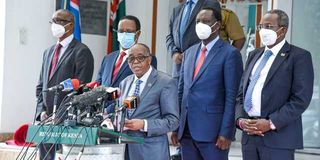Arrest, prosecute leaders inciting violence, security agencies ordered

Head of Public Service Joseph Kinyua with members of the National Security Advisory Council addresses reporters at Harambee House on October 7, 2020.
What you need to know:
- The committee told conveners of public gatherings to notify police three days in advance.
- Leaders allied to the Tangatanga and Kieleweke factions have been engaging in a war of words.
- Two people died in a confrontation between pro-Ruto and Mr Kenyatta supporters in Kenol, Murang’a County.
The government has read the riot act to politicians engaged in 2022 campaigns that have recently been characterised by violence and lawlessness.
Just a day after President Uhuru Kenyatta jetted in from official trips to France and Egypt, the National Security Advisory Committee (NSAC) Wednesday told the politicians that they would be held responsible for their actions and utterances.
The Jubilee administration has been facing a growing rebellion in its ranks as leaders allied to the Tangatanga and Kieleweke factions engage in a war of words.
Apart from an attempt to take control of the ruling party by Deputy President William Ruto, two people died in a confrontation between pro-Ruto and Mr Kenyatta supporters in Kenol, Murang’a county, on Sunday morning.
The committee told conveners of public gatherings to notify police three days in advance.
It means ward police chiefs have been given the authority to allow or deny conveners of such gatherings permission to hold the events.
“A convenor or any person intending to hold a meeting shall notify the officer at a commanding station three days before the procession,” Head of Public Service Joseph Kinyua said.
Maintain peace
Additionally, conveners of the meetings will be required “to be present throughout the gathering or procession and shall assist the police in the maintenance of peace and order”.
Dr Ruto and Orange Democratic Movement leader Raila Odinga are to attend separate events in Kisii County on Friday.
The fate of the events is not immediately clear since the NSAC directive took effect immediately.
Elgeyo Marakwet Senator Kipchumba Murkomen dismissed the NSAC statement, saying Mr Kinyua “is merely hitting the panic button”.
“The greatest threat to our national security is not social media or political gatherings. It is deceit, wrangles and fights at the highest level of government and the governing party,” Mr Murkomen tweeted.
By yesterday, police had not arrested politicians responsible for Murang’a chaos, apart from a Kibera resident whose photo appeared in the media.
Despite the fact that the protests appear to have been sponsored by politicians who ferried youth to the venue, the State had by last evening not given an update on investigations.
Summoned by police
Kiharu MP Ndindi Nyoro and his Kandara counterpart Alice Wahome, who had been summoned by police in Nyeri to record statements, have not done so.
The Nation has learnt of a growing rift between State security teams, making it difficult to act on the two lawmakers.
Mr Kinyua, who stood next to Interior Principal Secretary Karanja Kibicho yesterday, told security organs to enforce government directives without fear or favour.
He said the government would not tolerate utterances that incite and cause hatred, resentment and tension.
“Unchecked speeches and political weaponisation of public gatherings continue to undermine law and order. This has triggered violent confrontations among groups, thus threatening national security,” he said.
“In attempts to further selfish political agenda, individuals are inciting the youth. They are attempting to radicalise the youth to the point where they have fought and in one tragic incident, killed.”
Media
Media houses and social media users have not been left out in the fresh attempt by the government to enforce sanity in political discourse.
Mainstream media were warned against republishing utterances that sow discord among Kenyans.
“Media outlets shall not publish words intended to incite feelings of contempt, hatred, hostility, violence or discrimination against any person, group or community,” Mr Kinyua said.
In the last few weeks, social media have been awash with sponsored hashtags aimed at discrediting certain politicians while propagating hatred at the same time.
“Social media users shall be held liable for content on their profiles pursuant to the National Cohesion and Integration Act,” Mr Kinyua said.
“Every social media user shall ensure their content is written in a language that avoids a tone and words that constitute hate, ethnic contempt and incitement to violence, harassment, abuse, defamation or intimidation.”
Additionally, administrators of groups on social media have been directed to moderate and control discussions.
The administrators will be held responsible if the discussions contain hate.
However, Amnesty International and other rights groups said the warning is another attempt by the State to muzzle the media in the name of national security.
“The Constitution expressly prevents the State from penalising any person for any opinion and the content of any broadcast, publication or dissemination,” Amnesty local chapter executive director Irungu Houghton said.





